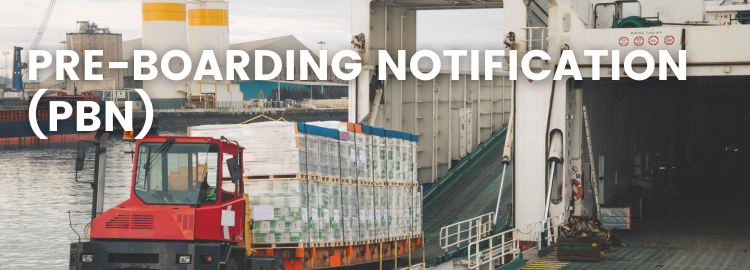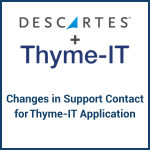Pre-Boarding Notification (PBN) Solutions

Pre-Boarding Notification (PBN) is an electronic message that is sent to Irish Revenue prior to the arrival of the means of transport to the Irish port.
A PBN includes vital information about your shipment, including the identity of the sender, the carrier, its destination, and a description of the goods included in the shipment, as well as logistical data such as the gross and net weight.
At Descartes Thyme, we offer a purpose-built Pre-Boarding notification (PBN) software solution, enabling our customers to generate a PBN via the Descartes Thyme system. This functionality also allows for the import of declaration data from existing AIS Imports and AES Exports.
Read on to find out more about our PBN solution and how they add value to our customers, or you can speak to a member of our team about booking a free demo today!
What is a PBN?
A Pre-boarding Notification, or PBN, is an electronic document which must be lodged with the Irish Revenue service prior to a shipment of non-EU goods arriving at a port. PBN is used to provide Irish Revenue with details about the goods being shipped, such as their type, quantity, value, and origin. The details of the Master Reference Numbers (MRN’s) of all the customs declarations relating to the goods are held together in one place with a PBN, which allows Customs to carry out risk assessments and inspections before the goods arrive. Pre-Boarding Notifications can also help to speed up the clearance process.
The creation of the PBN is the responsibility of the haulier or freight forwarder, who may delegate this function to the declarant, importer, exporter, clearance agent or logistics company. To ensure compliance with PBN regulations in Ireland, businesses must work closely with their shipping agents or carriers to guarantee that all PBN messages are submitted correctly and on time.
Our PBN Software Solutions
Here are some of the benefits of using the Descartes Thyme PBN Solution:
- Avoid duplicated entry of data by importing it from an existing declaration.
- Keep a record of all the PBN IDs (PBN MRNs) generated.
- Easily track the status of your PBNs.
Our users save unnecessary admin time, thanks to our all-in-one customs software solution, which allows you to create and manage your customs documents in a single place. Along with our team of experts, we can help to streamline your customs processes and simplify day-to-day operations for your team.
Our PBN solutions have been developed for Irish traders, to help them to grow their import and export businesses, and achieve faster clearance times with our cloud-based applications. For more information about our products and competitive pricing, or to book a demonstration, you can submit and enquiry via our contact page. To learn more about our full range of customs software, including our Irish Import and Export Declaration solutions, feel free to visit our website.
Pre-Boarding Notifications (PBNs): Frequently Asked Questions
What does PBN mean?
PBN stands for Pre-boarding Notification, a document which collects the Master Reference Numbers (MRNs) from each of the customs declarations involved in a shipment of goods to or from Ireland. Each PBN is unique and is assigned an identifying number, so that a consignment can be tracked and processed correctly on its way from its country of origin, to its destination.
Who uses pre-boarding notifications?
Pre-boarding notifications are essential documents, which must be used by importers accepting goods into Ireland, or exporters sending goods out of Ireland. They are also for the use of customs officials and other transporting staff, to aid in the quick processing and clearance of international shipments. However, the responsibility is on traders, or their customs agent working on their behalf, to ensure their PBNs are submitted correctly.
What’s the difference between the PBN system, and the Goods Vehicle Movement System (GVMS)?
The Pre-boarding Notification (PBN) system is used by traders when importing goods to Ireland, or exporting them to other countries. It is similar to the Goods Vehicle Movement System (GVMS) used at many ports in the United Kingdom, where customs declarations for shipments to the European Union (EU) can be provided in advance. This allows shipments to be pre-approved for transit, saving time and allowing for faster clearance at the final destination.
Like the GVMS, the PBN system requires traders to provide all the information needed by customs officials in a single, comprehensive document known as a PBN.
How do I create a Pre-boarding notification (PBN)?
To create a pre-boarding Notification, you can register with Revenue’s online web services, and use their online tool to create PBNs for your shipments, and track their progress.
You can also use Descartes Thyme’s purpose-built customs software solutions to generate a PBN from an existing customs declaration, keep a record of all PBNs submitted, and check the status of your PBNs. Our all-in-one customs solutions help many of our customers to transform and innovate their operations, and if you’d like to find out what we can do for your business, feel free to contact a member of the team.
What is a Pre-boarding Notification (PBN) number?
A pre-boarding notification number, or PBN number, is the unique identifying sequence of numbers used to track each PBN that you submit. This number can be used to track your shipment and monitor its progress through customs.
You will need to provide your PBN ID number to your potential ferry company, when you make a booking, as well as any drivers that will be handling the consignment. This is to ensure the consignment can be tracked at every stage of the transit process.
What is a Pre-boarding Notification check?
A PBN check is typically carried out by a driver, dropping your consignment off at the port, or freight airport of departure. They can use the PBN number to check whether the shipment has been approved, in which case they can proceed to check-in to offload the goods. However, if the PBN status is incomplete, or an issue has occurred, this means that the shipment has not yet been accepted, and the driver will need to contact their employer, or the business that is exporting the goods.




